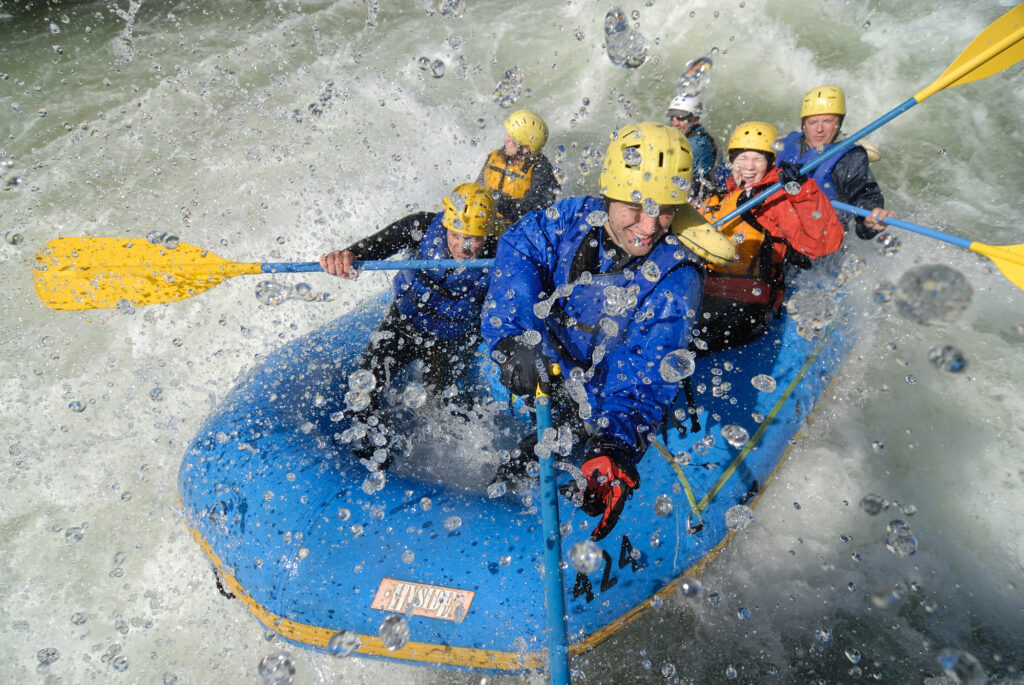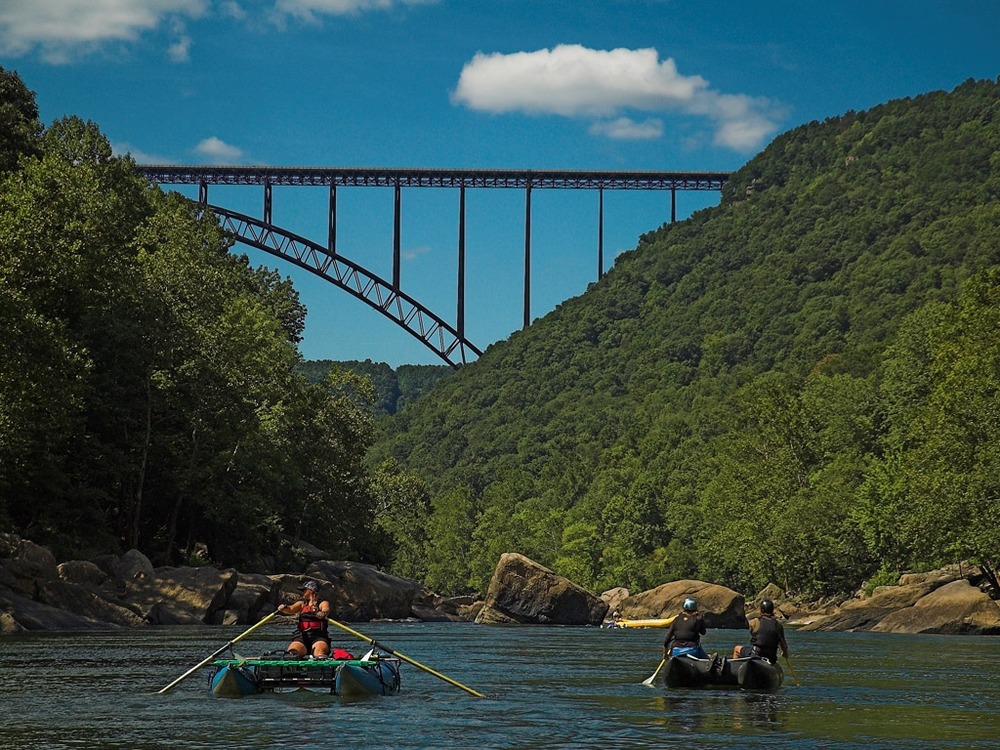MORGANTOWN, W.Va. – The $2.3 trillion COVID-19 relief and government funding bill signed by President Donald Trump on Dec. 27 had a small piece of legislation tucked in it that will have major implications on West Virginia. That nugget was the final draft of a bill to redesignate the New River Gorge National River as our nation’s 63rd National Park and 20th National Preserve.
Senators Shelley Moore Capito (R-W.Va.) and Joe Manchin (D-W.Va.) first introduced the legislation to redesignate the NRG – aptly named the New River Gorge National Park and Preserve Designation Act – in October 2019 to bring new tourism into the area to “spur the local and regional economy” according to a release by the Senate Energy and Natural Resources Committee.
The bill creates a 65,165-acre Preserve and a 7,021-acre Park, authorizes the National Park System to bid on additional land for the Preserve that amounts to 3,711 acres, authorizes the NPS to acquire 100 acres for parking and opens or keeps open 669 acres of hunting land in two different areas, Grandview (368) and the Lower Gorge (301), respectively. Of note, this is the first time hunting has ever been allowed in Grandview.

While both senators tout the bill as a major boost for West Virginia – “The New River Gorge is truly one of West Virginia’s most treasured playgrounds and largest tourist attractions because of its whitewater rafting, hunting, fishing, outdoor sports and natural beauty,” Manchin said in a press release before the vote. “This designation will increase its international recognition by highlighting West Virginia’s world-class beauty and resources.” – one group of residents disagrees: hunters.
According to a report by The Register-Herald, columnist Larry Case said, “Local hunters are not for it. We’ve just kinda been bulldozed over it. … When it comes to public lands, we can’t get enough of it and we don’t want to lose any of it. If you want to hunt, it’s the first thing you’ve got to have.”
As noted in Episode 3 of the OutPost Podcast, the West Virginia chapter of Backcountry Hunters and Anglers has vehemently opposed the legislation passed as it would strip hunters of 4,385 acres of access. While hunting is allowed on some National Parks, typically limited to small management units, it will not be allowed on New River Gorge National Park land. That differs for the Preserve, however. According to the same release by the Senate Energy and Natural Resources Committee, the Preserve has been legislated to carry over the current hunting and fishing regulations that are observed in its current National River designation, which means the West Virginia Division of Natural Resources retains its jurisdiction and hunters will still be able to access the same hunting areas as before with the same rules in place. Further, hunting, trapping and fishing are still protected on private lands that fall within the Park and Preserve boundaries.
West Virginia Division of Natural Resources Wildlife Resources Section Chief Paul Johansen sees the benefits for both parties.
“I think both Senator Manchin and Senator Capito have exhibited extraordinary wisdom in terms of reaching out and trying to coordinate, collaborate and have discussions with a wide variety of stakeholders, including hunters and anglers,” Johansen said. “I think they get it. We have a very strong hunting and fishing tradition here in West Virginia and people are very protective of those privileges. Crafting this legislation in the form of a National Park and Preserve was creative on their part; it was innovative. We don’t see many of them and I think this was an attempt by both senators to address the concerns of our traditional hunters and anglers … in terms of reaching out and trying to find a reasonable compromise, I think at the end of the day they found that compromise.”
Still, some hunters like Case are frustrated the legislation was thrown into the year-end legislation that was aimed at providing relief for a country stricken by COVID-19. Facing scrutiny from hunters over proposing the legislation from the beginning, West Virginia’s legislators held public meetings to hear these concerns. In other columns, Case cites that this was done with whitewater rafting businesses in mind while sportsmen and women were pushed aside. The one provision that can make hunters happy, however, is the allowance for the NPS to bid on those extra 3,711 acres. In addition to the land in the Lower Gorge and the new hunting grounds in Grandview, this would essentially offset the lost land now listed as part of the National Park.

In an interview with Vice, Backcountry Hunters and Anglers Government Relations Manager Julia Peebles noted the organization – and likely the West Virginia chapter – will push the NPS to buy the extra land.
“We look forward to working with the West Virginia delegation in ensuring hunting access in the Gorge for future generations, as well as committing to purchasing the 3,700 acres of private lands adjacent to the designated area,” she said.
Johansen spoke on the concerns Mountain State sportsmen and women face, too, returning to the belief that both senators worked to find that compromise for both the tourism industry and hunters and anglers.
“When we’re talking 65,000-plus acres being maintained or being opened to hunting and angling, and carving out a much smaller portion to be designated as a National Park, they made a good-faith effort,” Johansen said. “Is everybody satisfied and jumping up and down? I don’t know, it’s hard to believe everybody [is], but I do think the bill has come a very long way in terms of meeting the needs of hunters, anglers and traditional users.
“I think people are within their rights to express their concerns and opposition to this particular initiative. I think at the end of the day, both senators have made strong efforts to accommodate those concerns. I think this will all settle out. I’m particularly hopeful that West Virginians will be able to enjoy 3,711 acres of land that will be open to public wildlife associated recreation. I see this as a positive. I think this will have some significant economic impact in terms of attracting additional tourism and tourist dollars, but at the same time, I think that the rights and privileges of hunters are very much protected in this piece of legislation. I understand that there may be some net loss in terms of total acreage available for hunting. I recognize that, but I’m one to look at the glass half full and at the end of the day we’ve got 65,000 acres open to tremendous hunting opportunity and I think that’s a really good thing.”
Will this really help tourism?
The conversation of supplementing the state economy that heavily relies on the declining extractive industry has been happening for a while. The response was to begin bolstering our outdoor assets, of which the New River Gorge is a spectacle for residents and non-residents alike. According to Greg Corio, assistant vice president of the West Virginia University Outdoor Economic Development Collaborative, West Virginia is packed with opportunities.
“Businesses are moving to places for quality of life because of access to outdoor recreation,” Corio said in a previous interview with The Dominion Post. “For example, the Silicon Slopes in Utah. When they interviewed the 50 fastest growing businesses in Utah and why are they there, outdoor recreation came up as the top two reasons. The top reason was that they could steal talent from around the country to work there because of their access to outdoor recreation. The second reason was for the quality of life because the business owners wanted to be someplace that they could ski, climb and bike.
“For instance, within an hour and a half drive from Boise, Idaho, they have 98 miles of whitewater. Boulder, Colo., has 122 miles of whitewater in an hour and a half drive. Morgantown has 605 miles, Beckley has 820, Elkins has 875 and Thomas and Davis have 1,102 miles within an hour and a half drive. West Virginia has the densest whitewater of any state in the country. And as the west becomes drier, West Virginia is becoming wetter. So how do we leverage that as an economic advantage?”

Whitewater rafting is already a major tourist attraction in the New River Gorge area, and a National Park designation could drive new businesses into the area while bolstering already existing ones. Further, Capito noted that the new designation should increase tourism in the area by 20%.
It should also be noted that National Park visitor spending has been increasing since 2012 per numbers from 2019. Data from 2020 has yet to be released, which could show impacts from COVID-19. Still, visitors generated $41.7 billion in communities near national parks in 2019 and supported 340,500 jobs. Money spent increased by $800 million from 2018. According to the annual National Park Service report released in June 2020, “More than 327 million visitors spent $21 billion in communities within 60 miles of a park in the National Park System. Of the 340,500 jobs supported by visitor spending, more than 278,000 jobs exist in communities adjacent to parks.”
Yet, the New River Gorge has been in the NPS system since 1978, and though the new designation seems like nothing more than a facelift, it should increase tourism and bolster the efforts of the state tourism department, the WVU OEDC and other economic development hubs to push for a more outdoor-centric economic model. Only time will tell.
TWEET @andrewspellman_




